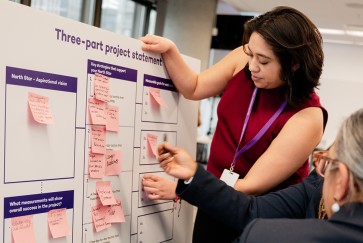Northwestern University is joining three Illinois universities to create a regional research center to address key scientific and technological challenges with powerful ideas from mathematics and statistics.
Led by the University of Chicago (UChicago), the new Institute for Mathematical and Statistical Innovation (IMSI) is funded with a five-year, $15.5 million grant from the National Science Foundation (NSF). The University of Illinois at Chicago (UIC) and University of Illinois at Urbana-Champaign (UIUC) also are members of the research center.

IMSI researchers will build a platform that accelerates the translation of applied mathematical and statistical techniques into solutions for urgent scientific and societal problems. Many of these problems arise naturally in a range of fields already being studied across the four partner institutions, including climate change, health care, quantum information theory, artificial intelligence (AI), data science, economics and materials science.
“Mathematics and statistics play a vital role in understanding the scope of current challenges and crafting solutions to address them,” said Bryna Kra, the Sarah Roland Professor of Mathematics at Northwestern’s Weinberg College of Arts and Sciences and co-principal investigator on the grant. “The founding of this Institute is an incredible opportunity to strengthen, stimulate and shape research in these areas, not just for Northwestern and the other founding members of the institute, but at the national level.”
The current complex environment of science and engineering research involves a deep interaction of multiple disciplines to address scientific problems. These interactions, which are often at very large scales, need sophisticated mathematical and statistical approaches that underpin solutions to the scientific problems. While enabling these applied mathematical approaches, IMSI will benefit from the institutional strengths of each of its university partners, both in the mathematical sciences as well as in the particular application areas of science, technology, economics and policy, drawing from the deep programmatic expertise of a network of centers and research groups.

“As society confronts massive issues in areas of public health, climate and the economy, to name a few, mathematics and statistics will play an increasingly critical role in identifying fundamental principles governing complex behaviors, and in finding effective methods to assess and address them,” said Eric Zaslow, professor and chair of Weinberg College’s Department of Mathematics. “IMSI will be a catalyst for scientific discovery and a platform for clear communication regarding some of the great challenges of our time.”
Modern, massively connected systems
Mathematics has always played a foundational role in establishing and exploring the theoretical and quantitative underpinnings of modern scientific discovery, often independently and years before the empirical science is established. However, recent advances in applied science and technology are challenging available models and paradigms developed by mathematicians and statisticians, providing a fertile ground for the discovery of new applied mathematical techniques and discoveries that have immediate applications to key modern applied scientific questions.
The rapidly developing field comprising data science, machine learning and AI provides a topical example. Over the past decade, scientific institutions, government agencies and industry have accumulated vast amounts of data associated with complex biological, technological, physical and social systems. Simultaneously, new methods of machine learning and AI have been developed to extract meaning and predictive outcomes from these data, becoming as essential a part of scientific discovery as theory, experiment and simulation. Yet as this work develops, the applied scientists have uncovered deeper layers and structures of these algorithms that are not yet fully understood from a mathematical theory perspective. Thus, science has served up a fertile area for fundamental mathematical work that will, once done and understood, instantly be useful to better understand and validate the very AI applications that pointed toward the mathematical problems. Such a potential for fundamental applied mathematics discovery, coupled with solutions to pressing applied problems, makes the establishment of IMSI an ideal and important platform at our institutions.
In the case of data and AI, these mathematical and statistical solutions will help explain a range of modern scientific and technological challenges characterized by massively connected systems and complex datasets, including the frequency and intensity of extreme weather events caused by climate change, the dynamics of global economic systems, interactions between genes and their environment, the organization and delivery of health care, the promise and limitations of quantum computing and the protection of individual privacy when dealing with large data sets containing sensitive information.
“There are many ways in which the mathematical sciences can help us come to grips with the massive growth in the amount of available data describing complex systems, as well as with the complex uses of computing now used to extract meaning from these data that may be leaving their mathematical and theoretical foundations behind,” said Kevin Corlette, professor of mathematics at UChicago and inaugural director of IMSI. “These include methods for evaluating the quality of data sets, simplification of models to improve their predictive power and their ability to provide insight into underlying principles, and new approaches to estimating the uncertainty of results predicted by models.”
“IMSI will be a vehicle for sustained engagement between mathematical scientists and researchers in a wide range of disciplines on these kinds of questions,” he said.
National platform for research, training and outreach
The complexity and scale of such new scientific challenges demand a diversity of perspectives and deep expertise that makes it difficult for any single institution to accomplish alone. Instead, optimal solutions are better achieved by systematically building institutional partnerships that bring together public and private universities, national laboratories and corporate partners in order to draw strength from and amplify the effectiveness of each, while allowing the partnership as a whole to transcend scale limitations.
IMSI will operate through such a partnership of four leading research universities in Illinois, building a national platform for research, outreach and workforce development to train the next generation of researchers in mathematics and statistics. The four sponsoring institutions bring together well-established intellectual and institutional resources in mathematics, statistics and many other fields.
The Institute will bring together researchers in application areas from across the nation and around the globe. Scientific activity will include workshops and long programs, typically a quarter (10 weeks) in length. Research activity will be organized around themes that will evolve over time, with an initial focus on data and information, climate science, health care, material science, quantum computing and information, and uncertainty quantification.
There will also be a sustained focus on communication with researchers in other fields, and in educating the public about the broad utility of mathematics and statistics to everyday problems and social issues. IMSI will sponsor outreach and workforce development programs aimed at K-12 students, teachers, undergraduates and graduate students to introduce participants to career opportunities in mathematics and statistics, especially those from communities traditionally underrepresented in the sciences.
“The influence of mathematical sciences on our daily lives is all around us and far-reaching,” said Juan C. Meza, division director of mathematical sciences at the NSF. “This program represents an investment in interdisciplinary connections across fields of science, and with impacts across sectors like computing, engineering and health.”
The NSF supports eight other mathematical sciences institutes to advance research in the mathematical sciences, increase the impact of the mathematical sciences in other disciplines, and expand the talent base engaged in mathematical research in the United States. Learn more at mathinstitutes.org.


